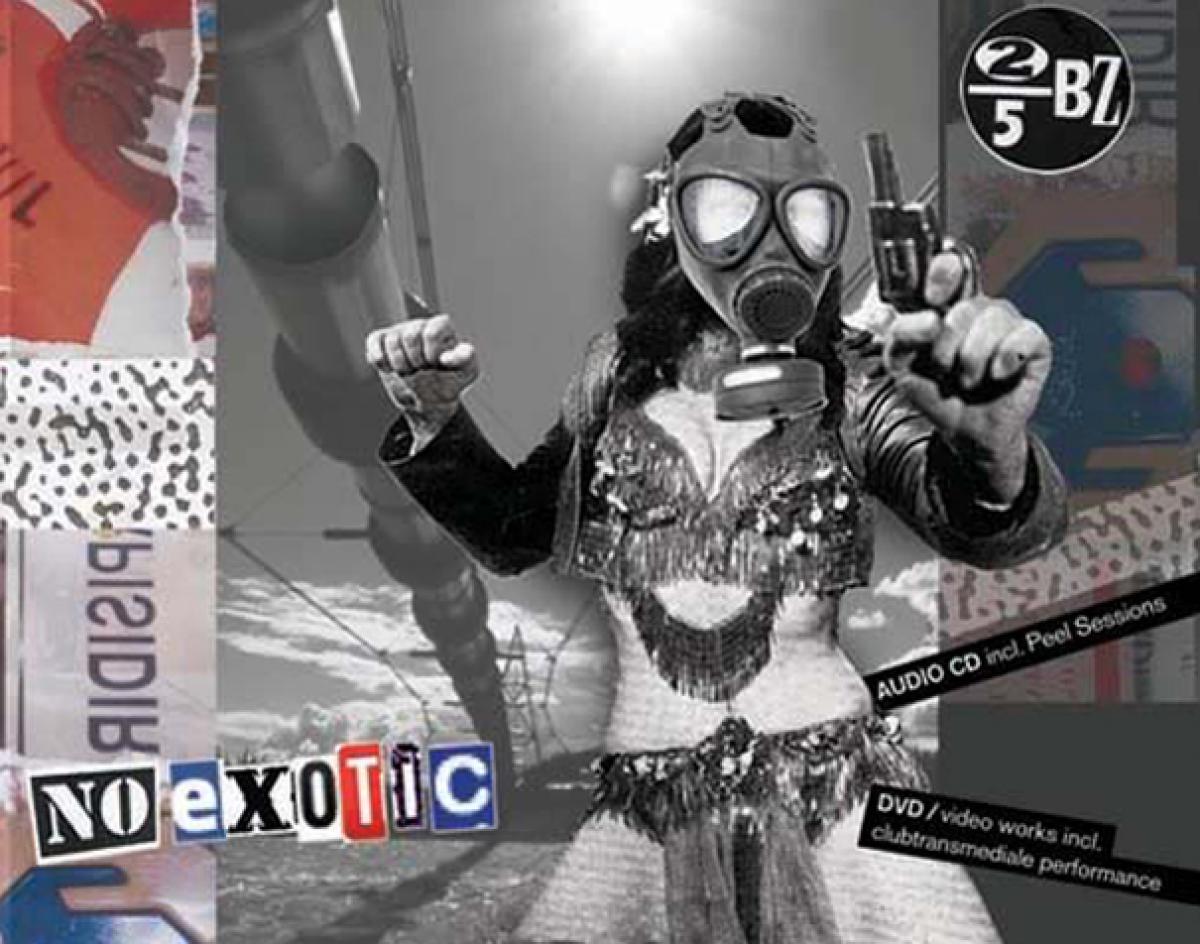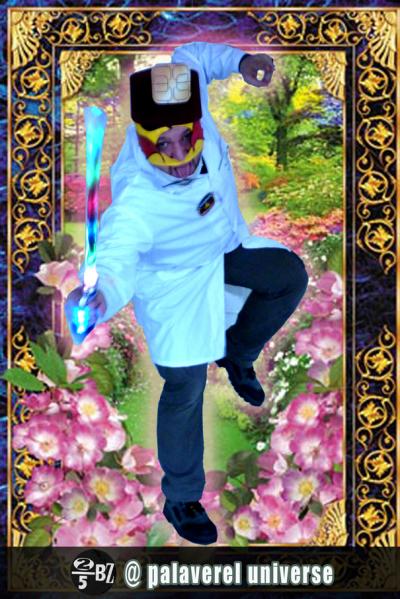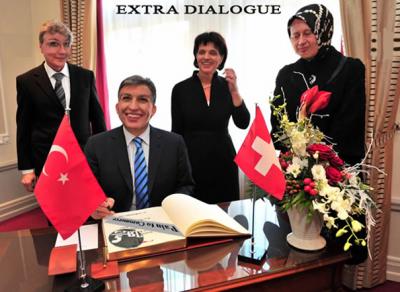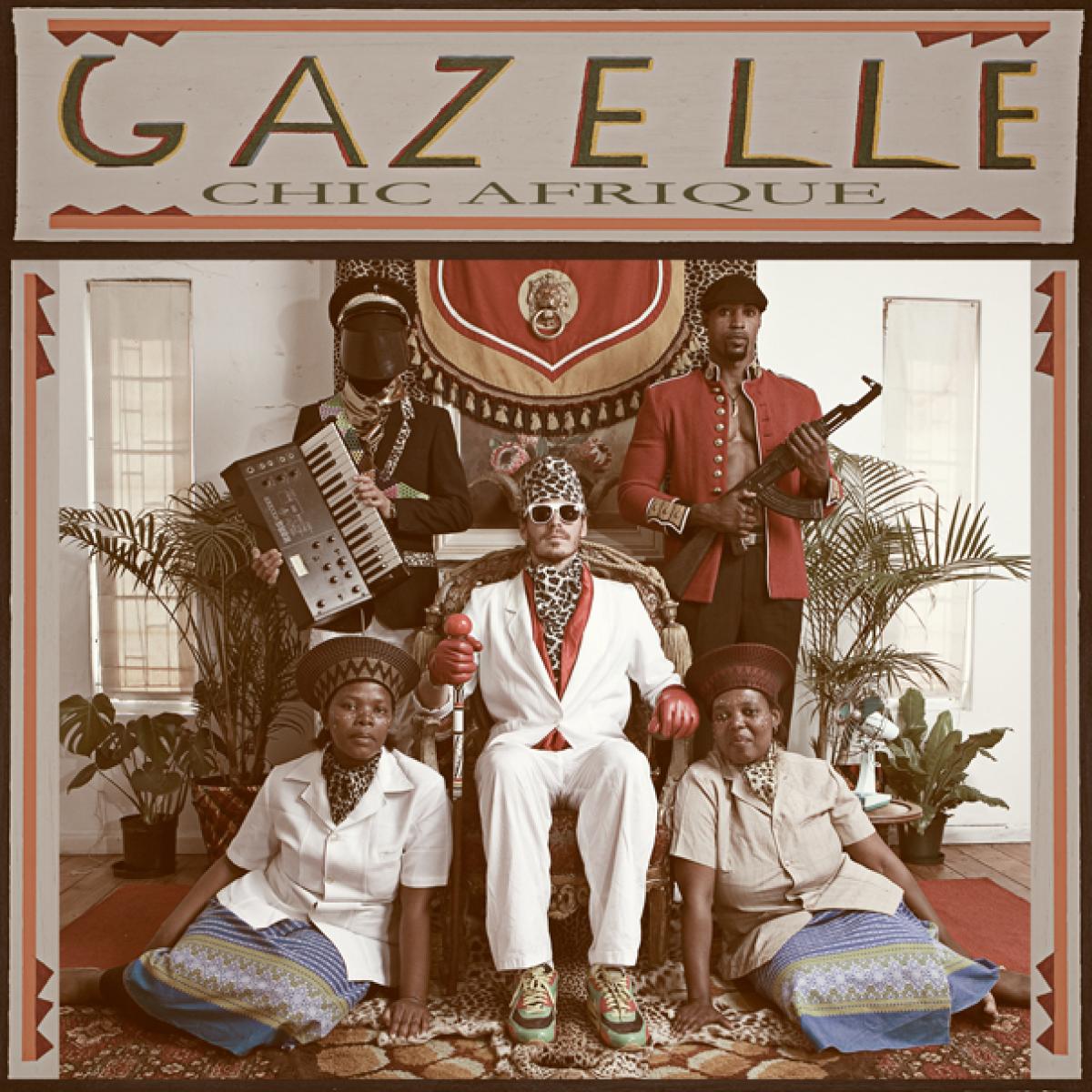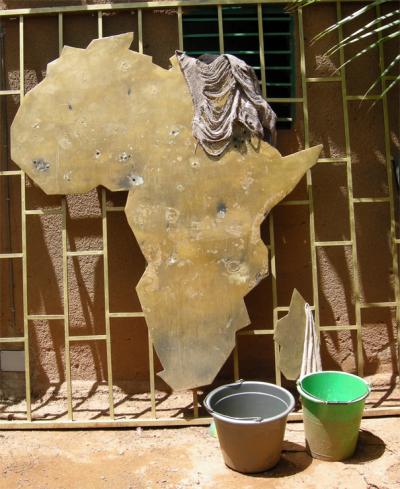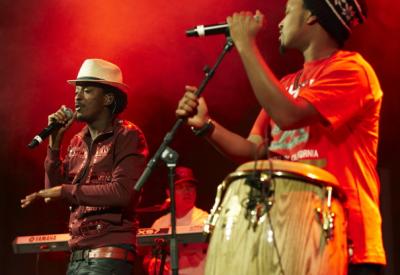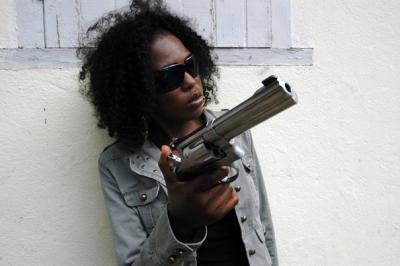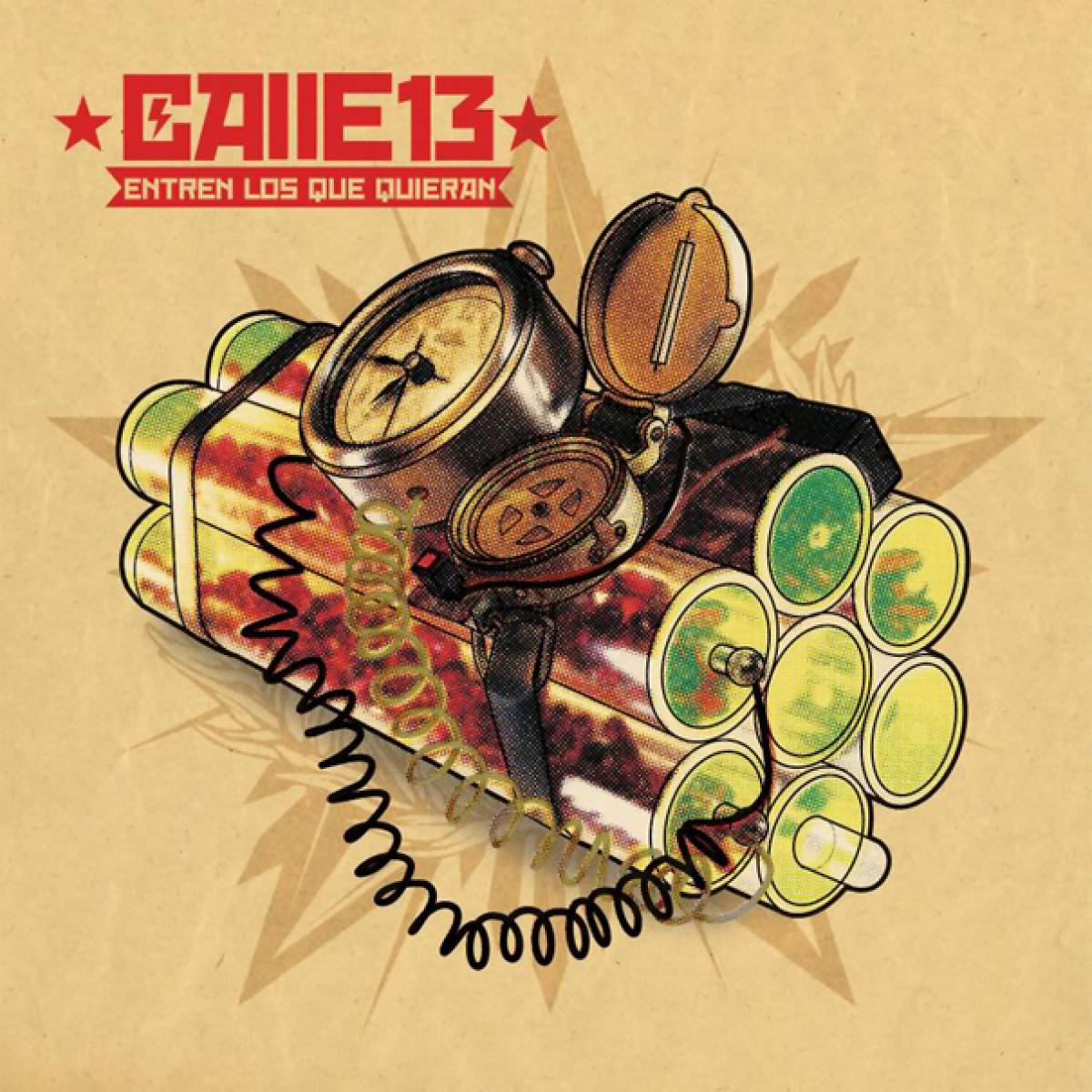Musikerinnen und Musiker aus Afrika, Asien und Lateinamerika verarbeiten Klänge und Klangformen mit den Prinzipien von Avantgarde, Pop-Avantgarde und jamaikanischer «Bass-Culture». Sie interagieren in Netzwerken mit Musikern weltweit und formulieren selbstbewusste nach-koloniale Positionen. Die vielen Parodien auf Exotika und der thematische Fokus auf Gewalt und Krieg deuten jedoch auch darauf hin, dass alte Abhängigkeiten im realen Markt weiterhin Bestand haben. Versuch eines Überblicks: mit empirischen Daten aus dem Libanon und Höreindrücken aus anderen Ländern.
«Die Avantgarde hat heute nicht mehr den aufklärerischen Anspruch der 1960er Jahre. Heute ist sie eine lustvoll künstlerische Reflexion über den Alltag einer Erlebnisgesellschaft.» (Jauk 2009, 36)
Utopisches(?) Intro
Es ist nicht einmal mehr in Ansätzen gültig, das alte Modell von Zentrum und Peripherie. Wir leben in einer Welt der multiplen, verwobenen Modernen (Eisenstadt 2000). Die Sozial- und Kulturwissenschaften verkünden das Ende der eurozentrischen Meistererzählung und erklären die einseitigen Modernisierungstheorien der 1950er und 1960er Jahre als ungültig (Shalini 2009). Dasselbe suggerieren auch neue Tracks, Lieder, Klang-Montagen und Krach-Gewitter aus Asien, Afrika und Lateinamerika: Moderne und Zeitgeist entstehen heute polyzentrisch im Austausch zwischen dem Globalen Norden und dem Globalen Süden (Kolland 2010).
Die beschleunigten Prozesse der Globalisierung und Digitalisierung haben das Musizieren auf vielen Ebenen revolutioniert. Weltweit finden heute Musiker neue Möglichkeiten, ihre Musik billig zu produzieren und unabhängiger global zu bewerben. Blog-Schreiberinnen, DJs und Kuratoren – die Multiplikatoren der Gegenwart – diskutieren bereits eine Vielzahl neuer Genre-Bezeichnungen. Weltmusik, in der Popwelt und der Clubszene lange belächelt, setzt heute Trends. Sie heisst jetzt Global Ghettotech, Ghettopop, Cosmopop, Worldtronica oder schlicht Weltmusik 2.0 – die Weltmusik der interaktiven Internetplattformen. M.I.A, die tamilische Künstlerin aus London, ist vielleicht die Speerspitze dieser Entwicklung. Ihr Soundtrack «Paper Planes» zum internationalen Erfolgsfilm Slumdog Millionaire verkörpert vieles, wofür diese Musik steht. In ihrer mehr-modernen Welt (Beck 2007) werden viele alte Gegensätze immer wieder aufgehoben: Gegenkultur versus Mehrheitskultur, Aktivismus versus Spass – und auch Erste Welt versus Dritte Welt. Im Video zum Track «Born Free» – von der 2010 erschienenen CD «Maya» – inszeniert M.I.A als Aktivistin radikalste Gewalt, indem sie rothaarige Männer exekutieren lässt – stellvertretend für Gefangene im Bürgerkrieg von Sri Lanka, wie sie behauptet. Der akustische Horror-Trip mischt Sirenen, Explosionen, Panikschreie, Krach und die als fiese Diktatorin inszenierte Stimme von M.I.A. Mit der Elektro-Pop Hymne «XXXO» (auch auf «Maya») strebt M.I.A dann musikalisch Richtung Popolymp. Ein exemplarisches Beispiel – wir werden es sehen: Weltmusik 2.0 lässt sich in kein Korsett mehr zwängen, sie ist widersprüchlich und mehrdeutig. Es klingt das Chaos der Welt, die Hektik des Alltags, die Wut über Weltpolitik und Wirtschaft, und die Hoffnung, sich via Musik eine Existenz zu sichern.
Utopische(?) Metaphern und reale Musikstile
Weltmusik 2.0 ist das Produkt von raumzeitlich entgrenzter Kommunikation jenseits territorialer Grenzen. Sie stellt überkommene Vorstellungen von Kultur, Identität und Gemeinschaft in Frage und lässt sich auch als eine dem Realismus verpflichtete Musique Concrète lesen – oder als ein akustischer (und visueller) Seismograph der Zeit: Sie ist die Musik der weltweiten Urbanisierung. Die Slums wachsen heute schneller als die Innenstädte – und genau so wächst auch die neue Variante der Weltmusik schneller als die Weltmusik 1.0, die immer für ein westliches Mittelklasse-Ohr gestylt war. Die Stadt der Zukunft wird nicht aus Glas- und Stahlkonstruktionen bestehen, wie es sich Urbanisten ausmalen, sondern eher aus grobem Backstein, Stroh, recyceltem Plastik, Zementblöcken und Abfallholz – das schreibt Mike Davis in seinem Buch «Planet der Slums» (Davis 2007). Auch die Weltmusik 2.0 recycelt alles und besticht in ihren besten Momenten durch ihre Direktheit, Dringlichkeit und Kreativität. Weltmusik 2.0 ist zudem genau so bunt, wie der virtuelle Zeitgeist, der heute medial über Blogs, Netzwerkgemeinschaften, Musik- und Videoplattformen vermittelt wird. Und sie ist so flüchtig, unberechenbar und flexibel wie das Leben im Zeitalter des digitalen Kapitalismus. Dieses ist immer stärker auf kurzfristiges und elastisches Wirtschaften ausgerichtet (Glotz 2001).
Stilistisch ist sie extrem breit, die Weltmusik 2.0: Kommerziell erfolgreiche Popmusikstile wie Reggaeton (Marshall, Rivera und Hernandez 2009) und Kwaito (Swartz 2008; Steingo 2005), Elektronika wie Kuduro (Siegert 2009), Nortec (Madrid 2008), Baile Funk (Stöcker 2009; Lanz, Gese und Gaber 2008) und Cumbia Electrónica, sowie regionale Ausprägungen von Rap stehen am einen Ende des Spektrums, Musique Concrète, Freie Improvisation, Bruitismus (Lärmmusik) und Klangkunst am anderen. Der vielen Unterschiede zum Trotz, lassen sich zwischen diesen weltweit verstreuten Musikern und Musikstilen aber doch deutlich Gemeinsamkeiten erkennen. Dazu zwei Hypothesen: 1. Die Musiker arbeiten mit den experimentellen Herangehensweisen von Avantgarde, Pop-Avantgarde und jamaikanischer «Bass Culture». Sie formen damit (endlich und deutlich) eine weltumspannende multi-lokale Avantgarde des 21. Jahrhunderts. 2. Sie konstruieren einerseits selbstbewusste nach-koloniale Positionen, zeigen sich andererseits aber auch immer wieder gefangen in den alten post-kolonialen Strukturen. Das zeigt sich besonders gut in ihrem dialektischen Umgang mit Exotika, Gewalt und Krieg.
Eine multi-lokale Pop-Avantgarde
Der Begriff der Avantgarde wird in der heutigen europäischen Musikdiskussion gerne mit Neuer Musik gleichgesetzt – mit seriellen Verfahrensweisen von Komponisten wie Stockhausen und Boulez, aber auch mit aleatorischen Richtungen um John Cage in den USA. Auf die Musiker der Weltmusik 2.0 passt nun der Avantgarde-Begriff in einer älteren und breiteren Definition (Hegarty 2009; Jauk 2009; Fähnders und Van der Berg 2009). Laut dieser suchen Avantgarde-Künstler den Bruch mit dem jeweils dominanten musikalischen Kanon; sie wollen Musik (und Kunst) neu in der Gesellschaft positionieren; und sie re-definieren die Rolle von Musik zyklisch neu – mal ist Musik Abbild des realen Lebens, mal eine Form von Protest, dann setzt sie entweder auf Schocktherapie oder Ironie, und schliesslich dient sie als Flucht in imaginäre Welten. Avantgardismen entstehen dabei an verschiedenen Orten nicht zeitgleich, sondern sie sind immer relativ, an einen bestimmten Ort und eine Jetztzeit gebunden. Eine lineare Abfolge zum Beispiel von Futurismus, zu Musique Concrète und Freier Improvisation ist deshalb nicht möglich. Weltmusik 2.0 ist heute zunächst eine multi-lokale Avantgarde aus der euro-amerikanischen Sicht: Sie mischt unsere Musikszenen neu und transportiert zudem neue nicht-musikalische Positionen. Ob gleichzeitig jeder einzelne Track in seinem Herkunftskontext als avantgardistisch durchgehen kann, muss von Fall zu Fall geprüft werden.
Avantgarde schliesst die Pop-Avantgarde nicht aus. Im engeren Sinn sind das Kunst-Popper wie John Lennon, Pete Townsend oder Brian Ferry – Abgänger von Kunsthochschulen statt von Konservatorien (Jauk 2009, 73). Im weiteren Sinne gehören auch «nicht-akademische» Pop-Musiker dazu: Rock’n’Roll, Psychedelischer Rock, Punk oder Krautrock – vor allem in den jeweils ersten Experimentierphasen. Weitgehend unberücksichtigt blieb – und bleibt – jedoch der «Black Sound» – so die These von Dieter Lesage und Ina Wudtke in ihrem Essay «Black Sound – White Cube» (Lesage und Wudtke 2010). «Black Sound», ob nun gespielt von schwarzen oder von weissen Musikern, fokussiert stärker auf Rhythmen als auf Harmonik. Er beinhaltet Stile wie Blues, Reggae, Calypso, Hip Hop, House, Dubstep und Grime und tut sich bis heute schwer, neben Konzerten und Club-Nächten auch in der Kunstwelt Platz zu finden – oder als Pop-Avantgarde wahrgenommen zu werden. Weltmusik 2.0 könnte auch hier für Veränderungen sorgen: Der südafrikanische Rapper JR fordert in seinem Kunst-Pop-Video offensiv «Make The Circle Bigger»; und den lesbischen, trans- und homosexuellen Bounce-Rapperinnen aus New Orleans (Fensterstock 2010) wurde 2010 in ihrer Heimatstadt eine ganze Ausstellung gewidmet.
Fokus Libanon, Ägypten, Palästina
Viele der Musiker der Weltmusik 2.0 arbeiten mit musikalischen Gestaltungsprinzipien, die wir aus diesen euro-amerikanischen Avantgarden und Pop-Avantgarden kennen. Sie greifen nach allen nur denkbaren klanglichen Angeboten und verarbeiten sie mal mit digitaler Sampler-Software (dem Instrument der Postmoderne), dann mit alten Reel-to-Reel-Tonbandgeräten, oder sie imitieren sie schliesslich mit akustischen Instrumenten. Sie etablieren eine Kunst des Alltags: Diese beinhaltet die Geräusche ihrer lokalen Umgebung und der technologisierten, post-industriellen Medienwelt. Der Beiruter Trompeter Mazen Kerbaj imitiert auf seiner Trompete die Geräusche des Krieges – lange tat er das unbewusst, dann bemerkte der österreichische Trompeter Frantz Hautzinger nach einem Konzert: «Deine Sounds klingen wie Helikopter und Bomben». Kerbaj kennt den italienischen Futuristen Luigi Russolo und sein Manifest «The Art of Noises» (Russolo 2005) von 1913 – beeinflusst ist er aber stärker von den Pionieren des Free Jazz und der Frei Improvisierten Musik, etwa von Peter Brötzmann und seinem Album «Machine Gun – automatic gun for fast, continuous firing». Ähnlich wie Russolo und die futuristischen Schriftsteller um Filippo Tommaso Marinetti zeigen aber auch Kerbaj und viele seiner Kollegen eine gewisse Faszination für den Krieg. Genährt ist diese allerdings durch nostalgische Erinnerungen an ihre ersten 15 Lebensjahre im Bürgerkrieg (Burkhalter 2007; 2011) – und nicht unbedingt, weil sie den Krieg wie die Futuristen als ein faszinierendes ästhetisches und mythischen Phänomen betrachten (Witt-Stahl 1999).
In der libanesischen Stadt Tripoli experimentiert Osman Arabi in den Fusstapfen des Bruitismus (Lärmmusik) mit radikalem Krach – und mit psychedelischen Sounds. Raed Yassin arbeitet – anders als Kerbaj – mit dem akustischen Material aus dem libanesischen Bürgerkrieg. Er mischt Feldaufnahmen, Medienfiles mit Geräuschen von Kontrabass und Stimme zu Klangkollagen – Stichwort Montage oder «Bricolage» im europäischen Avantgarde-Jargon. Yassin organisiert politisch konnotierte Klangereignisse (Propaganda-Lieder, politische Reden, Popmusik, etc.) neu. Nur von nicht-libanesischen Hörern kann diese Montage als eine rein akustische, akusmatische Musique Concrète gehört werden; für Libanesinnen und Libanesen ist sie eine Form von Protest – ob vom Künstler so intendiert oder nicht (Burkhalter 2011).
Auf den CDs des ägyptischen Labels 100copies experimentieren Klangkünstler mit den Geräuschen Kairos und elektro-akustischer Musik (Mahmoud Refat, Hassan Khan, Ramsi Lehner, Adham Hafez), und in Palästina mischen Rapper politische Texte mit Feldaufnahmen von Checkpoints (z.B. Checkpoint 303). Die Musikbeispiele aus Kairo scheinen dabei näher an einer akusmatischen Musique Concrète, während die Künstler in Palästina einen direkteren, aktivistischeren Anspruch deutlich machen – und somit vielleicht dem Bereich Soundscape-Komposition näher sind. Grundsätzlich zelebrieren die meisten dieser Musiker, was Wissenschafter als postmoderne Ästhetik bezeichnen (Manuel 1995). Sie springen hin und her zwischen Materialien aus so verschiedenen Genres wie Rap und Musique Concrète. Einige Musiker setzen dabei deutlich auf das Prinzip des Zufalls (Aleatorik): Charbel Haber von der Post-Punk-Gruppe produziert seine Aufnahmen in endlosen Verfahren zwischen Computermusik und Tape-Music. Die Band schickt Live-Aufnahmen von Jam-Sessions, manipulierte Gitarrensounds und Effekte der Software Reaktor bis zu fünf Mal zwischen Computer und einem Reel-to-Reel Tonbandgerät hin und her, um am Schluss «diese wirklich tiefen und schmutzigen Klangtexturen zu erhalten, die wir so sehr lieben» (Burkhalter 2010b).
Das Projekt «The Untuned Piano Concerto» von der Pianistin Cynthia Zaven basiert auf einer Performance aus Neu Delhi, für die sie ein altes, verstimmtes Klavier auf einen Lastwagen montieren und sich damit durch die Stadt fahren liess. Es resultiert ein akustische Interaktion zwischen improvisierten Klavier-Passagen, dem Hupen der Autos und anderen Strassengeräuschen. Auch in diesem Projekt reagiert der Zufall mit. Das Projekt entstand in einem Kunst-Kontext – auch das ist nicht ungewöhnlich für die Beiruter Szene.
Viele dieser Künstler arbeiten inter-disziplinär über die verschiedenen Kunstsparten hinweg (Stichwort: Fluxus): Tashweesh mischen Rap und elektronische Musik mit akustischen und visuellen Archivaufnahmen aus Palästina zu audio-visuellen Kurzfilmen.
Hassan Khan aus Ägypten hat seine multimedialen Arbeiten zu Klang, Bild und Text an zahlreichen Ausstellungen und Festivals im Nahen Osten, Europa und den USA präsentiert. Tarek Atoui schliesslich arbeitet zwischen Live-Elektronik und Computermusik. Er kreiert auf seinem Laptop akustische Landschaften voller Brüche und Kontraste: Ein Mix von Glitch-Sounds (Prior 2008), Samples von Politiker-Reden, chinesischen und arabischen Stimmen, Kriegsgeräuschen, Pop und vielem mehr. Dabei ist seine Musik keine Kopfgeburt, sie pendelt flink hin und her zwischen den alten Welten der E- und der U-Musik. In seinen Performances kontrolliert Atoui seinen Laptop, wie ein Rockstar seine Gitarre (Burkhalter 2010a) – dieses «hedonistische Copy and Paste» sieht Werner Jauk als typisch für die Pop-Avantgarde. (Jauk 2009, 67). Tarek Atoui lebte einige Jahre in Paris und arbeitete dort unter anderem an Projekten mit dem IRCAM (Institut de Recherche et Coordination Acoustique/Musique) am Centre Pompidou. Im Gegensatz zu dieser grossen Institution der Avantgarde des 20sten Jahrhunderts (und zu den Studios für elektronische Musik in deutschen und verschiedenen europäischen Städten) arbeiten Atoui und seine Kollegen in kleinen Heimstudios. Die Ausnahme bilden die «Ruptured Sessions» des Journalisten Ziad Nawfal am Radio Libanon. Nawfal lädt lokale Musiker zu langen Interviews ins Studio und lässt sie teilweise auch Tracks einspielen.
Fokus «Globaler Süden»
Diese Beispiele von Musikern aus dem Nahen Osten liessen sich durch Musikerinnen und Musiker aus Indonesien (Wallach 2008), Indien, Mexiko und anderen Ländern des Globalen Südens ergänzen. Besonders in afrikanischen und lateinamerikanischen Städten pendeln Musiker unbeiirrt hin und her zwischen Gegenkultur und Mehrheitskultur – sie tun das stärker als die Musiker in der arabischen Welt, in der sich eine «alternative» Popszene neben der extrem kommerziellen panarabischen Popmusik bis heute schwer tut (Burkhalter 2010c). Diese Musiker scheinen mit geprägt von der Dringlichkeit und Aggressivität verschiedener US-amerikanischer und britischer Clubstile: von Detroit Ghettotech (Mueller 2007), Baltimore Club (Devereaux 2007) bis zu Dubstep (Hürter 2008) und Grime – sie prägen diese Stile aber direkt oder indirekt auch selber mit. Der Kwaito aus den Townships Südafrikas, der nach dem Ende der Apartheid in den Neunzigerjahren das Lebensgefühl junger schwarzer Südafrikaner mit verlangsamten House Beats, Andeutungen von lokalen Stilen (Mbaqanga, Kwela, «Bubblegum») und aggressiv klingenden Sprechgesang (in Zulu, Sotho und im Township Slang tsotsitaal) so sehr auf den Punkt brachte ist heute – von der südafrikanischen Musik- und Werbeindustrie vereinnahmt – zu einer geschliffenen Kommerzmusik verkommen. Abgelöst wurde der Trend aber von südafrikanischem Rap und House, oder von Shangaan Electro aus den Townships von Südafrika. Shangaan sampelt verzwickte Marimba- und Orgel-Melodien, kurze, repetitive Gesangspassagen und organisiert sie über zurückhaltende, aber rasend schnelle Rhythmen (um 180 BPM) zu einem sich ständig verändernden akustischen Organismus. Die Musik klingt eigenständig und neu.
Auch die Jagwa Musik aus Dar e Salam klingt experimentell, aber sehr wohl lokal. Hier klingen wirre und verstimmte Melodien auf von einem billigen Casio-Keyboard über Poly-Rhythmen.
Viele der Musiker der Weltmusik 2.0 bekommen immer wieder dieselben Vorwürfe zu hören: Sie seien Künstler, keine Musiker; sie seien elitäre Kosmopoliten, die ihren Herkunftskontext bloss aus einer privilegierten Perspektive kennen würden; und sie kopierten bloss musikalische Stile und Formen aus dem Globalen Norden. All diese Musik als Kopien abzutun, würde dieser Musik – und den Musikern – nicht gerecht. Christopher Miller betonte in einem Panel mit dem Titel «Local Experiments: Decentering the Global Avant-Garde» an der jährlichen Konferenz der Society of Ethnomusicology in Middletown 2008, dass Musiker in Indonesien zwar John Cage nicht kennen würden, aber dennoch mit ähnlichen Gestaltungsprinzipien arbeiteten. Andrew Mc Graw kritisierte am selben Panel, dass wir experimentelle Ästhetiken gerne vorschnell auf unseren euro-amerikanischen Kanon münzen. Die Musiker in Beirut sind zwar bestens über die euro-amerikanische Avantgarde und Pop-Avantgarde informiert, ihr musikalischer Ausdruck ist aber auch geprägt durch ihre unmittelbare akustische Umgebung: die akustische Sozialisation im Krieg, die lokale psychedelische Rockmusik-Szene der 1960er Jahre, und vieles mehr. Die standardisierte klassische arabische Kunstmusik und die «nationale» libanesische Musik (eine Aufarbeitung von lokaler Folklore für den grossen Konzertsaal) dienen diesen Musiker gleichzeitig als negative Vorbilder, von denen sie sich aus verschiedenen Gründen abgrenzen (Burkhalter 2007; 2010a). Diese Musiker kopieren also nicht bloss, sondern musizieren aus ihrer persönlichen Perspektive und Position.
Neben dem transnationalen Zeitgeist in ihren spezifischen Musik-Nischen, sind sie zudem beeinflusst von der postmodernen Ästhetik anderer Kunstdisziplinen und von nicht-musikalischen Phänomenen der Jetztzeit. Und: Diesen transnationalen Zeitgeist in Musik und Kunst nur als «westlich» zu definieren, ist nicht legitim. Gerade Avantgarde und Pop-Avantgarde waren immer und entscheidend mitgeprägt von Diaspora-Künstlern aus Afrika, Asien und Lateinamerika (Fähnders und Van der Berg 2009, 264).
Selbstbewusste nach-koloniale Positionen
Johannes Ismaiel-Wendt definiert Populäre Musik per se als postkoloniale Musik. Er beobachtet ein Fortwähren von Repräsentations- «Rasse» und «Kultur»-Diskursen in der Popmusik und wertet diese als eine Form von Rassismus und Post-Kolonialismus (Wendt 2010). «Verweise auf Orte, Regionen, Länder beziehungsweise Nationen oder Kontinente bilden ein zentrales Ordnungssystem populärer Musik», schreibt er. Ein grosser Teil der Weltmusik 2.0 Musiker würde ihm recht geben. Ein anderer Teil nicht: Diese Musiker decken «exotischen» Fremddarstellungen ihrer Heimatländer aktiv auf und inszenieren sie als «farbenfrohes» Spiel.
Die meisten Weltmusik 2.0 Musiker gehören dem ersten Lager an. Sie wenden sich ab vom anhaltenden euro-zentristischen Fokus auf das «Traditionelle» in ihren nicht-westlichen Heimatländern. Diese Musiker wollen die Vorliebe für «kulturelle Differenz» von uns Europäern, Musikethnologen und Musikliebhabern nicht befriedigen – wenigstens nicht auf den ersten Höreindruck. Sie wollen persönliche musikalische Identitäten schaffen, jenseits von Selbst-Exotisierung, Kommerzialisierung und Propaganda.
Vor allem die Weltmusik 2.0 Musiker aus Afrika, Lateinamerika und «Diaspora»-Musiker in den USA und England markieren dabei letztlich eine neue Variante des Afro-Futurismus. Der Musiker und Produzent Steve Goodman (alias Kode 9) (Goodman 2010) liest diesen Afro-Futurismus als eine von Afro-Amerikanern getragene kulturelle Strömung, die den Stellenwert des afro-amerikanischen Erbes (Stichwort «Black Atlantic» (Gilroy 1993)) und der jamaikanischen Bass-Kultur (Bradley 2003) für die Konstituierung der Moderne hervorhebt. Er beschreibt wie afro-amerikanische Künstler in musikalischen Genres wie Reggae, Dub, Dancehall, Jazz, Rap, und House zum einen subkulturelle Trends schufen und zum anderen mittels «Audio-Viren» auch den euro-amerikanischen Mainstream prägten – und dies besonders in den Tiefenstrukturen der Musik und des Musizierens: mit spezifischen musikalischen Mustern (z.B. Rhythmus-Pattern), künstlerischen Ansätzen (z.B. Improvisation) und Techniken (z.B. Sampling). Eric Davis (Davis 1996) argumentiert ähnlich, wenn er in seinem Online-Essay «Roots and Wires» die Arbeiten von John Miller Chernoff (Chernoff 1979) zu Polyrhythmik in der afrikanischen Musik auf britische Clubmusikstile überträgt – auf das «The Hardcore Continuum» (Reynolds 1999) von Ardcore (Hardcore Techno oder Hardcover Rave) in 1990, Jungle, Drum’n’Bass, Garage, Two-Step, Grime, Dubstep und UK Funky.
Diese «Audio-Viren» infiltrieren den Mainstream, ohne sich mit Exotismen oder Orientalismen anzubiedern. Die «Science Fiction»-Symbolik des «klassischen» Afro-Futurismus ist dabei einem stärkeren Realismus gewichen. Die Videos und Texte von K’Naan wirken so, als wollte dieser somalisch-kanadische Rapper unsere Seh- und Hörnerven überreizen: Da stehen somalische Piraten plötzlich neben den Klischee-Piraten von Walt Disney, Löwen und Elefanten neben somalischen Kriegern und Bürgerkriegsaufnahmen, die Beatles neben Stars der afrikanischen und afro-amerikanischen Musikgeschichte – Bob Marley oder Fela Kuti. Dass K’Naan für die Fussball-WM von Südafrika den offiziellen Coca-Cola-Clip «Waving Flag» produziert hat, zeigt nur, wie erfolgreich und unverkrampft diese neue Generation zwischen Gegenkultur und Mehrheitskultur agiert.
Der dritte, bislang kleinere Teil der Weltmusik 2.0 Musiker, hat den Reiz von exotischen und psychedelischen Klängen für sich wiederentdeckt. Unter der Stil-Bezeichnung «UK Funky» mischen Diaspora-Musiker aus Afrika und der Karibik seit drei Jahren die Londoner Clubszene auf. Sie mixen Afro Beat, Breakbeat, UK Garage und karibische Stilformen und spielen selbstbewusst mit kulturellen Stereotypen. «Spiel mit meinem Bongo, Baby», singt die Backgroundsängerin im Videoclip «Bongo Jam» der Crazy Cousinz. Im Video «Tribal Skank» von Fr3e vollführen Afrikaner mit Baströcken und Handys wilde Paartänze mit britischen Geschäftsmännern und Polizisten. Erfolgreiche UK-Funky Tracks kommen jeweils mit ihrem eigenen, spezifischen Tanzstil, genannt Skank. Die Choreographie wird im öffentlichen Tanzkurs-Video auf YouTube gelehrt.
Aus der Sicht von post-kolonialen Theoretikern – und auch von vielen Weltmusik 2.0 Musikern – mag dieses Zelebrieren von Exotika erstaunlich wirken, wenn nicht sogar ernüchternd. Denn für viele bleibt die lange Tradition der Suche nach anderen exotischen Klängen und Rhythmen im westlichen Musikschaffen negativ konnotiert (Locke 2009): In den USA des 19 Jahrhunderts wurde die schwarze Bevölkerung in den sogenannten Minstrel Shows von weissen Sängern und Schauspielern parodiert; in der europäischen Musik experimentierten Komponisten wie Claude Debussy (in Java), Béla Bartok (in Ungarn) Leos Janacek (in Tschechien) und viele andere mit Volksmusik-Traditionen; und im Genre Weltmusik (1.0), einer Repertoire-Kategorie ab Mitte der 1980er Jahre (Binas-Preisendörfer 2010), liessen sich Pop-Produzenten und Musiker wie Peter Gabriel und Ry Cooder von der lokalen Musik «anderer» Kulturen inspirieren. Spätestens seit Mitte der 1980er Jahre vermischten indische und pakistanische Musiker zweiter Einwanderergeneration dann in London Sitar-Melodien und Tabla-Rhythmen mit Club-Beats. Sie gaben an, ihre Heimatländer nicht folkloristisch, sondern modern darzustellen (Hutnyk 1996; Burkhalter 2000). Oft reproduzierten sie dabei aber alte Stereotypen und zelebrierten eine essentialistische, multi-kulturelle Hybridität: hier Europa als «moderner» elektronischer Grundbeat (und Basis), dort Asien als (pseudo)traditionelles Ornament.
Weltmusik (1.0) will unversehrte musikalische Formen und Idiome hochleben lassen, mischt dann aber Sounds der vollständig kommerzialisierten Gegenwart mit der pseudohistorischen «Patina anderer Zeiten und Orten» (Erlmann 1995). Veit Erlmann definiert den inter-kulturellen Ansatz der Weltmusik 1.0 über den Begriff «Pastiche» und meint dabei eine spezielle Art der Parodie, bei der der polemische oder satirische Akzent völlig fehlt. Diejenigen Weltmusik 2.0-Musiker, die neu mit Exotika arbeiten, haben nun «Pastiche» durch Parodie ersetzt – sie agieren dabei ähnlich, wie Musiker aus der Pop-Avantgarde, die sich immer begeistert zeigten für die sogenannten «primitiven»Völker (Primitivismus) und ihrer Fetische (Fähnders und Van der Berg 2009, 98; Toop 1999). Die Beiruter Musiker äussern sich sowohl fasziniert von den Beatniks der 1950er und 60er Jahre und der psychedelischen Rockmusik der 1960er und 70er Jahre, als auch von der Schlagermusik der 1950er Jahre. Die Beatniks und einige ihrer Vorväter (Paul Bowles, Alan Hovhaness, Jack Kerouac, William S. Burroughs, Allen Ginsberg, etc) und viele psychedelische Rockmusiker waren fasziniert von literarischen und musikalischen Visionen von Fernost-Asien, Nord Afrika und dem Nahen Osten (Hieber 2009). Die Musik entstand dabei immer im Austausch zwischen Musikern aus Ost und West: Der ägyptische Komponist Halim al-Daph (*1921) stand mit der Beat-Generation in losem Kontakt. Er gilt heute als einer der ersten Avant-Garde Komponisten der arabischen Welt (Seachrist 2003). Und The Freak Scene ist eine von vielen US-amerikanischen Gruppen, die mit Exilarabern zusammenarbeitete. 1967 nahm sie das Album «Hard Rock from the Middle East» auf. In Beirut kämpften zur selben Zeit rund 200 psychedelische Rockbands um die Gunst des Publikums – sie formierten sich zu einem Netzwerk von Musikern, Clubs und Fans und schufen so den Boden, auf dem arabische Nischenmusiker heute an ihren Karrieren arbeiten.
Die Musiker blicken heute auch auf die Tourismus-Industrie der 1950er Jahre zurück – mit ihren arabischen Nachtclubs in New York, Paris, Beirut und Kairo. Die Musik in den Nachtclubs «violated every boundary of authenticity» schreibt Rasmussen (Rasmussen 1992). Es ist die Offensichtlichkeit und Leichtigkeit dieser künstlerischen Karikaturen auf den Orient, die einigen der heutigen Musiker als Vorlage dient. Der Ägypter Omar Khorshid vertonte in den Nachtclubs von Beirut und Kairo Hits wie La Cumparasito und La Paloma. Kritiker nennen Khorshid den James Last der arabischen Welt. Für viele Musiker hingegen gilt er als Genie: wegen seinem Surf-Gitarren-Stil und seinen virtuos vorgetragenen Tremoli.
Psychedelisch klingt heute die syrische Szene des «New Wave Dabké» (Silverstein 2007). Diese Dabké-Musiker steuern ihre Synthesizer mit kleinen Midi-Boxen. Sie erzeugen die typischen arabischen Vierteltonhöhen und imitieren den schrillen Klang der Doppelrohr-Oboe Mijwiz, dem traditionellen Dabké Instrument schlechthin (Rasmussen 1996). Die Szene hat jetzt auch ausserhalb ihres eigentlich informellen Kassetten- und MP3-Marktes eine Fangemeinde gefunden – in erster Linie dank einer Welttournee des syrischen Sängers Omar Souleyman, organisiert 2009 vom US-amerikanischen Indie-Label Sublime Frequences. Der verstorbene BBC-Weltmusik-Pionier Charlie Gillett äusserte sich kurz vor seinem Tod fast schon empört über ein Londoner-Konzert dieses Sängers. Das sei der schlechteste Hochzeitssänger, den er je gesehen habe. Man kann nüchtern festhalten: Die alte, saubere und sanfte Weltmusik wird attackiert und ersetzt durch neue, unbequemere Sounds. Bald werden also vieleicht auch andere lokale Popstile von der internationalen Weltmusik 2.0-Gemeinde entdeckt: Arabesk aus der Türkei (Stokes 2000), jil aus Nordafrika, oder turbo folk aus Ex Yugoslawien – ob als exotische Eintagsfliegen oder mehr wird sich weisen.
Alte Machtstrukturen und Problemfelder
Damit sei es bereits angedeutet. Die Vision einer Welt der multiplen Modernen hat weiterhin ihre Risse. Weltmusik 2.0 entsteht noch immer im Austausch zwischen den Metropolen des Südens und den Zentren des Nordens – und kaum jemals zwischen den verschiedenen Zentren Afrikas, Asiens und Lateinamerikas. Auch heute bleiben DJ’s und Produzenten (DJ Rupture, Ghislain Poirier, Diplo, Richard Russell, etc.), Labels (Mad Decent, Man Recordings, Dubsided, XL Recordings, Outhere Records) Veranstalter (Secousse, Favela Chic, Beat Research, etc.), Kulturförderer und Medienschaffende aus den USA und Europa ihre wichtigsten Förderer. Das Thema wirtschaftliche Ausbeutung ist nicht vom Tisch. Diplo, einer der Produzenten von M.I.A., hat den lauten, auf Drumcomputer-Rhythmen basierten Baile Funk aus den Favela von Rio de Janeiro für die Welt mit entdeckt. Auf seinen CDs, Mixtapes und Dokumentarfilmen («Favela on Blast», «Favela Strikes Back») fehlt aber oft eine Auflistung der Künstler (Scruggs 2010). Das Musizieren ohne Copyright-Beschränkungen fördere Austausch und Kreativität: Dieses oft gehörte Argument stimmt nur, wenn sich die Künstler des Nordens und Südens auf Augenhöhe treffen – wenn etwa Schlachthofbronx aus München, Spoek Mathambo und Gnucci Banana aus Südafrika und ihr Label Man Recordings ihren Track «Ayoba» offiziell freigegeben: Jetzt finden wir auf der Plattform Soundcloud über 100 Remixe des Tracks. Eine zeitgemässe Erfolgsstrategie.
«Zu Beginn des neuen Jahrhunderts ist kaum mehr auszumachen, was als kulturelle Widerstandsstrategie verstanden werden soll und was als kommerzielles Kalkül in Marketingabteilungen der Unerhaltungsbranche konzipiert wurde», schreibt Susanne Binas-Preisend (Binas-Preisendörfer 2010, 81). Im Fall der Weltmusik 2.0 sind das oft nicht zwingend Marketingabteilungen, sondern Musiker, die versuchen, mittels Strategien ihre eigenen Karieren voranzutreiben. Der neue Fokus auf Exotika kann aus dieser Perspektive auörferch als ein strategischer Essentialismus verstanden werden: Denn Obskures, Ironisches und Exotisches profitiert überproportional vom Lawineneffekt der virtuellen Mund zu Mund Propaganda auf Plattformen wie Facebook. Das südafrikanische Kunst-Pop Kollektiv Die Antwoord spielt mit dem Stereotyp des primitiven, Bier trinkenden weissen Südafrikaners. Was die Band damit aussagen will, bleibt offen – zumal sie es tunlichst vermeidet, öffentlich und ernsthaft über ihre Motivation zu sprechen. Das Problem mit Ironie und Parodie: Sie wird bloss von Insidern verstanden, im freien Markt hingegen mutiert sie schnell zur skurrilen Spasskultur.
Der Trend zur Inszenierung von Krieg und Gewalt provoziert ähnliche Fragen. M.I.A. und Mazen Kerbaj sind zwei von vielen Beispielen: Die jamaikanische Sängerin Terry Lynn zum Beispiel inszeniert sich auf ihrer CD «Kingstonlogic 2.0» als stolze Slum-Bewohnerin mit Pistole in der Hand. Sie rappt über tiefe Subbässe, Gewehrschüsse und abstrakte Beats.
In den mit Handys aufgenommenen Kuduro-Videoclips aus Luanda tanzen leicht bekleidete Frauen mit jungen Männern, die im angolanischen Bürgerkrieg ein Bein verloren haben. Der Kuduro, der aus einem parkierten Minibus hinaus scheppert, gilt als die erste, rein elektronisch produzierte Musik Afrikas überhaupt. Diese billig produzierte Musik tut sich allerdings schwer, den ästhetischen und produktionstechnischen Geschmack des transnationalen Weltmarkts zu treffen – so demokratisch also ist sie auch nicht, die Weltmusik 2.0.
Die Glaubwürdigkeit von M.I.A wird inzwischen angezweifelt: Die Schwiegertochter des Warner-Music-CEO Edgar Bronfman soll Provokation bloss als Mittel zum Zweck nutzen, um sich endgültig im Mainstream festzusetzen. Mazen Kerbaj gibt es in Interviews zu: Von seiner Vermutung, dass seine Kriegserinnerungen seine heutige Musik prägen, hat er zum ersten Mal einen deutschen Journalisten erzählt. Wollte er sich damit all der ständigen Fragen entledigen, wo denn das lokale in seiner Musik versteckt sei? War es einfach ein geschickter Schachzug, sich als einzigartige Stimme im weltweiten Feld der Frei Improvisierten Musik festzusetzen? Oder war das mehr? Ein Urteil ist schwierig. Aus der internationalen Perspektive haben Musiker wie Kerbaj das exotische Element der Weltmusik 1.0 (die orientalische Musik) durch ein neues exotisches Element ersetzt, den Krieg. Im Libanon hingegen bricht Kerbaj mit einem Tabu, indem er öffentlich über den libanesischen Bürgerkrieg diskutiert. Und er verarbeitet traumatische Erfahrungen (Burkhalter 2011).
Theoretische Verortungen
Weltmusik 2.0 ist ein theoretisches Konstrukt. Der Begriff weist auf zwei Dinge hin: Weltmusik 2.0 nutzt zum einen die Möglichkeiten des zunehmenden digitalisierten Musikmarktes zu einer freieren und vielfältigeren Produktion von Musik, zum anderen ist Weltmusik 2.0 noch immer eine Variante von Weltmusik 1.0. Sie hat sich noch nicht ganz von eurozentristischen Anspruchshaltungen emanzipiert – auch weil die Geldgeber oft aus Europa stammen. Die Musik verkauft sich entweder an kuratierte Events (Weltmusik-Festivals, thematische Ausstellungen) über Exotika, Spass und Krieg. Oder sie agiert in ihren jeweiligen transnationalen Nischenkulturen und bleibt dort Freie Improvisation, Elektroakustische Musik oder Post-Punk. Beide Märkte zu bedienen, ist das Ziel nicht weniger dieser Musiker.
In der Tendenz ist der Schritt von Weltmusik 1.0 zu Weltmusik 2.0 jedoch ein Sprung von inter-kulturellen zu trans-kulturellen oder gar hyper-kulturellen und super-kulturellen Musikformen. Im Modus der Interkulturalität werden zwei Musiktraditionen (oder Stile) verschiedener geographischer Herkunft so fusioniert, dass die betreffenden Traditionen (oder ihre klischierten Vorstellungen davon) weitestgehend unverändert bleiben (Beispiel Asian Underground) (Welsch 1994; Rosengren 2010). In den anderen Modi wird Kultur nicht mehr als abgeschlossenes System gesehen. Je nach Modi bleiben kulturelle Referenzen und Prinzipien dabei stärker (trans-kultureller Modus), weniger stark (hyper-kultureller Modus) (Welsch 1994; Byung-Chul 2005) oder gar nicht mehr hörbar (super-kultureller Modus (Lull 2000; 2002)). Oft überschneiden sich die verschiedenen Modi dabei innerhalb eines einzelnen Musikstücks.
Veit Erlmann schlägt vor, Weltmusik (1.0) nach der Art und Weise zu untersuchen, in der die Geschichte eines kulturellen, sozial-politischen Kontexts in die Musik (oder in das Produkt) selber eingeschrieben ist (Erlmann 1995, 10). Dieser Ansatz macht auch für Weltmusik 2.0 Sinn – allerdings darf ein –kultureller Modus nicht über den anderen gewertet werden. Wichtig ist zudem, genau hinzuschauen, in welchen sozialen, ökonomischen und politischen Realitäten ein Musiker lebt und aufgewachsen ist – und wer letztlich von der Weltmusik 2.0 profitiert: der Musiker, der DJ, der Blogschreiber, der Labelbesitzer, oder der Kurator.
Reale Grenzen des Nationalstaates
Jeweils am ersten Freitag im Monat wird im Exil Club in Zürich ein Einbürgerungsbüro aufgebaut. Im einfachen Holzkasten sitzt eine Schauspielerin. Sie tippt die Anträge der Gesuchsteller für eine Bürgerschaft in der fiktiven Demokratischen Republik of Tam Tam im Zweifingersystem auf einer alten Schreibmaschine ein. Was die Club-Reihe Motherland hier inszeniert, ist zwar ein Spiel, und doch ein ernst gemeinter Hinweis auf die zentrale Grösse der Gegenwart: auf die Grenze zwischen dem Nationalstaat und dem globalen Feld (Derrida 2005). Klänge und Klangformen mögen weltweit schweifen, aber für die Musiker ist noch immer die nationale und politische Grenze bindend. Im Visa- und Passbüro entscheidet sich, ob ein Künstler aus Afrika, Asien oder Lateinamerika auch physisch in der weltweit vernetzten Szene der Weltmusik 2.0 mitmachen kann – oder ob er bloss ein Lieferant von Sound-Samples bleibt.
